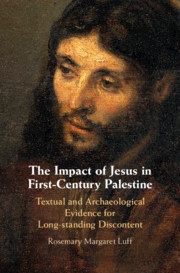 The Impact of Jesus in First-Century Palestine
The Impact of Jesus in First-Century Palestine Book contents
Part I - Memories of Jesus: The Textual Evidence
Published online by Cambridge University Press: 26 July 2019
Summary
The strong eschatological vein portrayed in Jesus’ teaching raises questions concerning the nature and degree of instability being experienced by the inhabitants of Galilee and Judea. This chapter evaluates the documentary evidence for discontent at the time of Jesus, against a backdrop of foreign invasions and conquests over five hundred years. There is substantial evidence that there was discontent among the people: the cumulative evidence from Josephus, the Dead Sea Scrolls, certain apocalypses, and the Evangelists, especially the literarily distinct Gospels of Mark and John, supports this. After the Feeding of the Five Thousand clearly a large crowd wanted Jesus as their leader, even their king, and tried to coerce him into this, but he was not interested. His focus was on God and the implementation of his kingdom through discipleship. As an apocalyptical and eschatological prophet Jesus believed that God’s rule was in the process of happening, and he is remembered as warning about judgement to come for the unrepentant. His ministry centred on the welfare of the poor, and their inclusion in the coming kingdom.
Keywords
- Type
- Chapter
- Information
- The Impact of Jesus in First-Century PalestineTextual and Archaeological Evidence for Long-standing Discontent, pp. 7 - 74Publisher: Cambridge University PressPrint publication year: 2019


